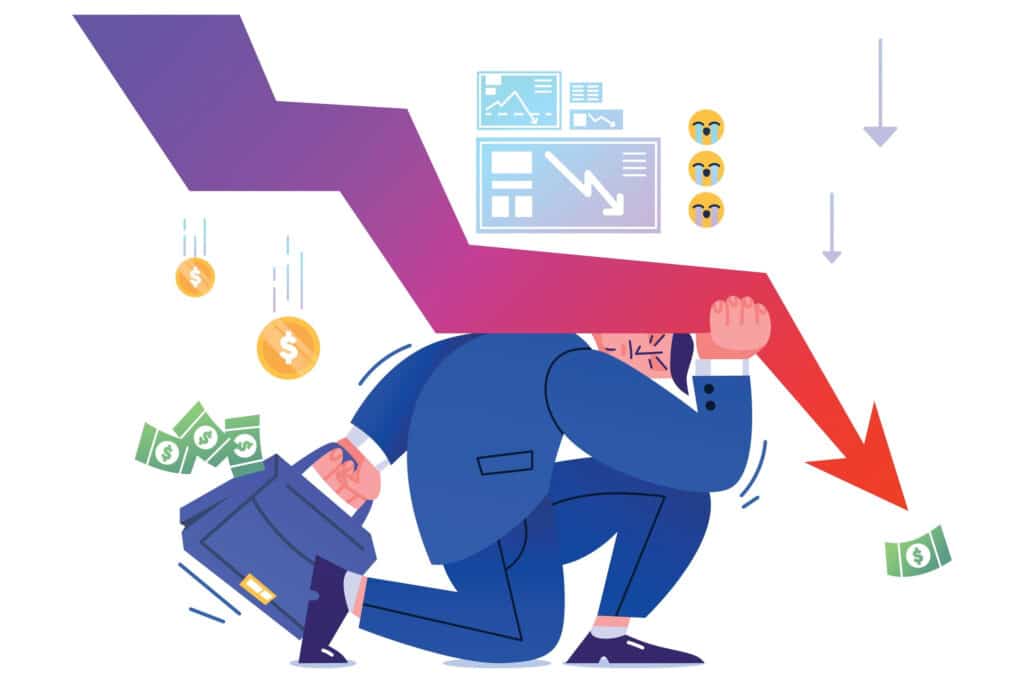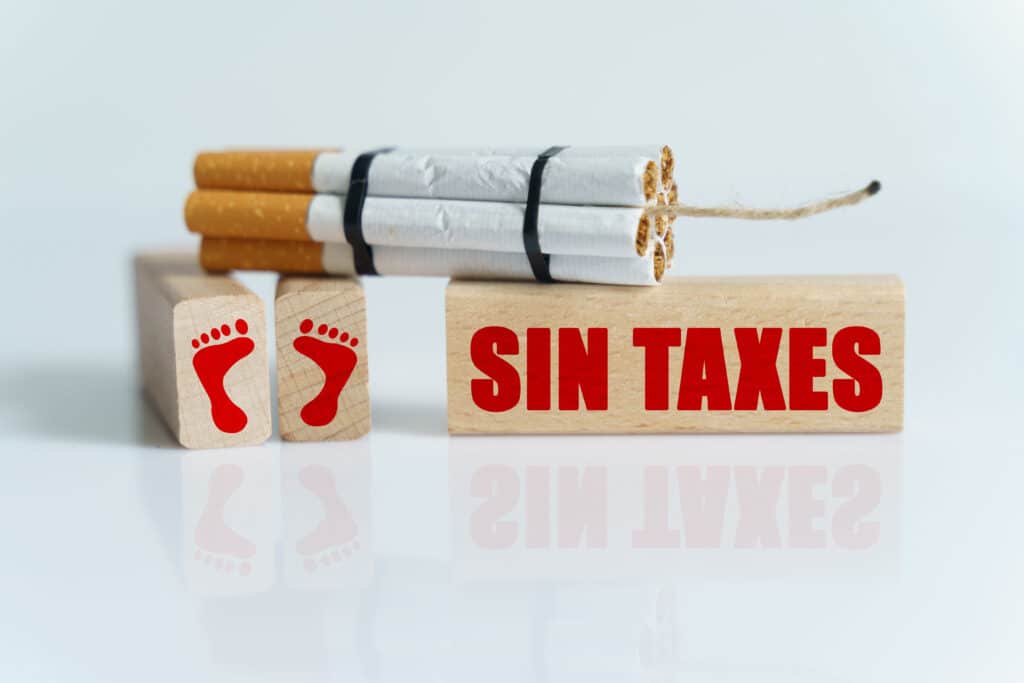The cannabis industry is rife with problems; and the problems are becoming one of its biggest commonalities. For the Canadian government, the issue is exemplified by a struggle to collect cannabis excise taxes. Right now, the inability to get payments from many companies, leaves the Canadian government as one of the biggest creditors in the cannabis industry.
Canadian government a main creditor of cannabis companies
Canada’s cannabis industry, along with US industries, has a lot of problems; and collecting tax payments is one of them. Canada is already sending tax collectors out for the growing unpaid excise taxes that companies aren’t coughing up. These general issues are exemplified by companies outside of taxation, and involve layoffs, restructuring activities, closures, and stock market issues, as well.
There is a major shortcoming in this industry wherein companies cannot earn profits; with as few as 24.4% earning a profit in 2022, according to cannabis consulting firm Whitney Economics. This brings up the question of how a company which is having a hard time simply staying afloat; is going to pay off its debts to anyone.
MJBizDaily recently did a review of the insolvency filings from different companies. The information comes through the Canada Revenue Agency and Health Canada; which are in charge of tax collection and regulation, respectively. One of the more interesting filings is from the Vancouver-based cannabis producer Tantalus Labs.

Tantalus, like many other companies, is having problems. Recently it filed court paperwork in British Columbia, to pursue an Intent for Restructuring. What the paperwork shows, is that one of the company’s biggest creditors that its unable to pay, is the Canadian government. Half the company’s unsecured debts (any debt without guarantor or collateral), are to the country’s government; which is one of 92 creditors that Tantalus owes.
In total, Tantalus owes $8.4 million CAD, and $4.5 million of that is owed to the Canadian government in unpaid cannabis taxes. The money was supposed to be paid to Canada’s Receiver General, which is the body that takes payments for the federal government. The company also has a debt to Health Canada, which is far less at $388,490 CAD. This means that between two government agencies, Tantalus owes 58% of its current debt.
Where else we see this
Perhaps these filings make clear why the Canadian government has been flailing around so much. There’s a lot in unpaid taxes – MJBizDaily put it at $192.7 million CAD just to the Canada Revenue Agency (CRA) as of March 31st of this year. The Receiver General and Health Canada are other agencies that came up a lot as unpaid creditors in the filings. This is not the majority of tax money by any means, as the country brought in about $1.5 billion in tax revenue (excise, sales, fees) from the 2021-2022 year. The goal, of course, is not to collect some tax money, but all of it; and to not have a growing trend of companies not paying.
Here’s a similar story. Another Canadian company, this time Ontario-based Aleafia Health, had to enter into creditor protection when its proposed merger with the US company Red White & Bloom didn’t go through. Of the company’s $29.7 million CAD in unpaid debts, the Canadian government is the biggest listed creditor, accounting for $15.8 million of the company’s debt. Most of this is indebted to the CRA.
A third story from 2023 shows the same thing. Ontario-based Phoena Group, likewise went under creditor protection this year. Paperwork for this move highlighted that the Canadian government was #3 on the list of unpaid creditors in terms of amount owed. The $1.8 million owed to the government, was broken down between the CRA, Health Canada, and the Receiver General.
Why is this happening?
The big question in this, is why it’s happening. And not just related to these companies; but the entirety of the legal weed industry, both in Canada and the legal US states. Why aren’t taxes paid, why aren’t loans paid back, why aren’t prices competitive with the black market, why are so many companies tanking out in what was supposed to be the next gold rush industry?

Some look at it like its just what happens in business when a company can get away with something. MJBizDaily quotes Brock University associate professor Michael Armstrong, as saying “If you are running a cannabis company and you realize you don’t have enough money to pay all your debts, then you’re going to ask, ‘Who can we put off?’” He continues, “It seems that companies are realizing they can procrastinate on the excise taxes and other government fees.”
Armstrong makes a good point, but this skirts the general issue. Sure, maybe that’s what a company does when it has to choose between options in a tight monetary situation. The better question isn’t what motivates a specific company to make this decision; but why we’re seeing it so often that it’s a normalcy of the weed world. There are a ton of other industries in life that have chugged along for decades or more without such problems.
The CEO of industry group Cannabis Council of Canada, George Smitherman, spoke with MJBizDaily on the matter. In his words, “It’s increasingly clear that, for many cannabis companies, insolvency is the result of a formula where taxes and fees squeeze out such a big proportion of the overall price.”
What to do about it?
Good question. The resulting governmental measures thus far indicate either a failure to comprehend the situation on the part of government entities, or an insistence on keeping certain revenue lines in place. The Canadian government did say earlier that it wants to look at the issue of cannabis industry regulatory fees. It posted a notice of intent this year, meant to get the reevaluation wheels turning to improve current conditions in the industry at large. However, it mentioned nothing about taxes.
Black market operators don’t deal with any of this. There are no fees for licenses, or exorbitant sin taxes. Black market operators can quickly cut prices to stay competitive, without long processes to change laws or institute new ones. And while some regulatory measures are arguably good (though this market has certainly thrived for decades without them), that black market operators aren’t paying for them, also indicates less overhead. The black market can earn more, because its required to pay out less. And any legal market not thinking of what this means for pricing, is never going to make it.
When compared to a system set up to nickel and dime companies at every juncture, its not surprising that the black market is still so powerful in comparison. As its not likely to go away no matter how many fear campaigns come out, attacking these costs (taxes and regulatory fess) head on, seems to be the best (and possibly only) way, for the legal industry to survive.

Canada isn’t the only hapless market which can’t seem to get it right. California went through a whole tax-restructuring process last year to help aid its failing industry. And while it did cut one cultivation tax (it says a lot for the sheer number of taxes that I can say that line), much like Canada, it didn’t want to touch the issue of excise taxes. Excise taxes are paid between entities in the supply chain, and are factored into total cost. The customer pays them in the regular price of the product.
The majority of the excise tax in the cannabis industry is a sin tax. These taxes are put on products that the government deems as dangerous. Not only does every legal location charge huge taxes of this kind, but they don’t serve any purpose except extra income for the government. They’re not a part of a regular tax structure; and they don’t apply to most products in life. The market doesn’t need them to survive, and instead is damaged by their existence.
California was not helped by its move. In fact, in light of it roundly not being enough, the state defaulted to another standard line. It now wants to call out any legal operator that’s done anything not 100% by the book. So rather than implementing a working system, it created one that abuses its own operators; and then goes after anyone that does what they need to, to survive the hostile environment.
Conclusion
Canada is sure up a creek without a paddle; as are many US states. Rather than think logically about what can work, it continuously skirts the issue, to hang onto the nice big sin tax and regulatory fees that are helping to ruin the industry overall. Perhaps Canada could balance its books if it worked on implementing realistic taxes. This issue shows the greed of governments; which would rather pretend to debate the topic as companies fail, than make logical moves to promote a long-lasting market.
Hey there cannabis supporters! We appreciate you stopping by Cannadelics.com, an independent rag reporting on cannabis, hallucinogens and the general drug world. Come around frequently to stay up-to-date on current stories; and check out the Cannadelics Weekly Newsletter, so you’re always first to get the news.









